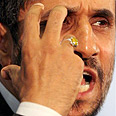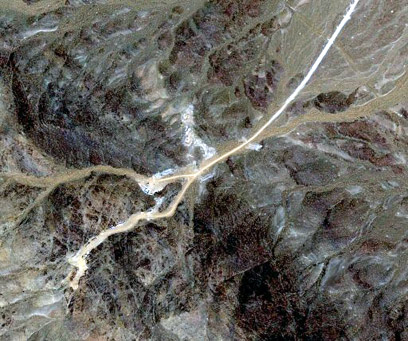
In fact, his father was still alive, and would only die a year after Ahmadinejad's radio broadcast, due to heart failure. This is the first of many startling revelations found in "The Nuclear Sphinx of Tehran: Mahmoud Ahmadinejad and the State of Iran," a recently published book by Israeli journalist Yossi Melman and Iran analyst Meir Javedanfar.
In their meticulously researched work, Melman and Javedanfar provide what is perhaps one of the most in-depth looks at the personality of Ahmadinejad, his messianic and terrifying religious beliefs, and the continuous cat-and-mouse-game being played by the International Atomic Energy Agency (IAEA) and Iran, as the Islamic Republic steams ahead with its project to complete its military nuclear weapons program.
A panoramic view
After providing a panoramic view of Ahmadinejad's fascinating personal history, his affinity to Iran's working classes, and his unsustainable economic reforms, "The Nuclear Sphinx of Tehran" goes on to describe the cult of the Shiite messiah, the Mahdi, led by the radical Shiite cleric Ayatollah Mesbah Yazdi, who believes that Muslims "should strive to hasten" the Mahdi's return.
Gradually, a circle of Yazdi's followers overcame adversaries to take control of key parts of the Iranian government; the ministries of intelligence, security, and Iran's National Security Council, before one of Yazdi's most devout followers, Mahmoud Ahamdinejad, was voted in as Iran's president.
Revealing interviews with Israeli security and diplomatic officials show how western intelligence agencies realized, late in the day, that Iran was building the bomb, and scrambled to thwart the Iranian Manhattan project. The IAEA's headquarters in Vienna became a covert battle ground between Iranian and western intelligence agencies.
Some of the most chilling scenes in "The Nuclear Sphinx of Tehran" describe how IAEA inspectors came to the realization that Iran utilized technology provided by the renegade Pakistani nuclear scientist Dr. Abdul Qadeer Khan in its nuclear program.

Intended nuclear plant site in Iran (Photo: Reuters)
On other occasions, the Iranians refused IAEA inspectors access to sites suspected of being part of Iran's shadow military program. After increased pressure and a large time delay, the inspectors were allowed to enter the sites, only to find that they had obviously been emptied and renovated.
One such site is the Kalaye "electrical wall clock" factory in eastern Tehran. Hundreds of samples taken by IAEA inspectors showed the sites contained "particles of highly enriched uranium (HEU) mainly used to produce nuclear weapons."
'Sanctions may hold Iran back'
In an interview with Ynetnews, Yossi Melman, the book's co-author, said economic sanctions could delay Iran from acquiring nuclear weapons by a few years in the best-case scenario, but that only a military strike could ensure that Iran would never go nuclear.
After completing the book, the reader is left with the impression that if military action is not taken immediately, the world will have to come to terms with a nuclear Iran. Do you agree?
I hope that maybe Iran will be stopped through the UN's official sanctions and practical measures, which are a series of financial strikes on Iran by the West and Japan.
There is also the interesting position of Russia, which is unwilling to provide Iran with fuel to the nuclear reactor in Bushehr, which Russia has built, and which in effect has been completed. But the chances of this happening (stopping Iran by sanctions) are no more than around 30 percent.
There is also no doubt that financial sanctions can prevent Iran from acquiring nuclear weapons by a few months to two-three years. Only a military strike can totally prevent Iran from achieving its aim. Otherwise, we will indeed have to live in the shadow of the Iranian nuclear mushroom.
In your book, you outlined a number of very clear signals showing that Iran's nuclear program has a military purpose. Why does the IAEA continue to insist on talking to the Iranians despite Iran's repeated attempts to deceive it?
Because the IAEA is a bureaucratic organization belonging to the UN, and its considerations are political-diplomatic, its aim is to arrive at an international consensus to satisfy everyone, and of course this is an impossible mission.
In my book, there is quite a detailed explanation of the IAEA's decision-making process and the divisions that exist between inspectors on the ground and their managers in Vienna, as well as the judicial department, and the IAEA's chairman Muhammad El-Baradei.
In this process, the inspector's findings are watered down and reports are deliberately filled with technical and diplomatic jargon, so that we won't understand what the author meant.
There is another problem: The IAEA inspectors can only see what they see, and from what they see, they find it difficult to reach a clear conclusion that Iran is aiming for a nuclear (military) program.
The only smoking gun you can get in a nuclear program is to test a nuclear weapon, or when a State already possesses a nuclear weapon. The rest is a series of operations which individually can appear innocent but when looked at collectively, can only have one meaning: A military nuclear program.
Do you believe US President George Bush has decided to opt for a military strike?
This is a difficult question. It's the 64,000 dollar question. I doubt if someone knows the answer. I doubt there is an answer at this stage.
President Bush, in my view, is continuing to think it over. I can only say the following: In 2001, Richard Perle, an advisor to the US Department of Defense and an associate of President Bush and Vice President Cheney, and a neo-conservative, said that Bush would set out for a war in Iraq.
The comments, after September 11, 2001, sounded delusional. In retrospect, he was right of course. While interviewing him for the book, Perle claimed a few months ago that he believed that President Bush would give the order to strike Iran, without much difficulty, if he reached the conclusion that Iran was about to obtain nuclear weapons.
His estimate has been strengthened by recent comments by a senior US military officer who visited Israel. He said the US military was preparing for, and making plans for the possibility that it would receive an order to attack Iran.
Do sanctions have a chance at making Iran give up on nuclear weapons?
Yes, absolutely. Iran is afraid of sanctions and is doing everything to prevent them from being placed on it. To this end, it is even willing, apparently, to show flexibility, as we saw over the weekend in its agreement to the renewal of visits of IAEA inspectors to Arak, where a heavy water facility is operational, and in which a "research" core has been built to produce plutonium.
There are also more painful sanctions, such as those carried out by banks and private financial bodies in the West and Japan, which choke the Iranian economy and especially the oil industry, which is crying out for foreign investment to the tune of tens of billions of dollars.
Is there any good news in all of this?
No. The world is in a race against the clock to prevent other states from reaching nuclear weapons. This is a holding defense and the result is already clear.
As the number of countries with nuclear weapons increases, so too will the dangers of the use of those weapons, whether by accident, negligence, or with malice (such as a terrorist group getting hold of nukes).
The only chance to stop the proliferation of nuclear weapons lies in the five permanent members of the Security Council getting together and taking a decision to disarm themselves of nuclear weapons. But this is a vision of a far distant future and I doubt it will be realized.















